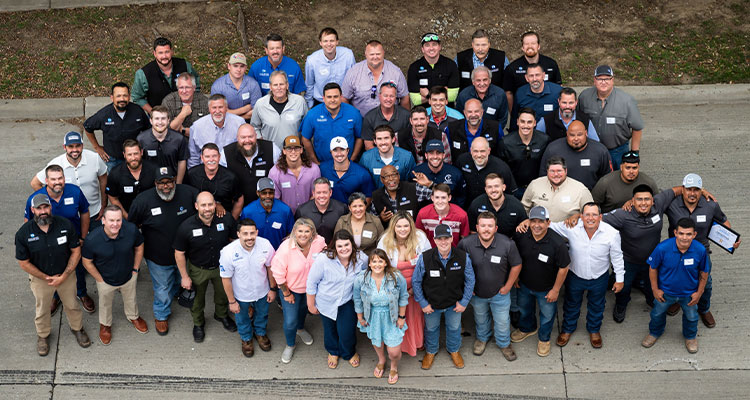With a focus on lean principles, seamless project management, and client-first values, Talley Riggins Construction is reshaping industry norms
Formed just six and a half years ago, the Talley Riggins Construction Group has already taken the industry by storm. Having experienced an impressive rate of growth, it has quickly evolved into a major player in the Texas construction sector. Based in Richardson, it is ideally positioned to deliver major commercial, institutional and healthcare projects across the Dallas/Fort Worth area, and its portfolio reflects the high-value, high quality builds for which it has become known.
The story begins with Co-Founders Doug Talley and John Riggins, Chief Executive Officer and Company President, respectively. Starting out with a vision of what a general contractor could be, they have worked hard to make that dream a reality. John begins: “Since starting out in May 2018, we’ve grown into an 85-person firm, working across multiple market segments, including commercial, healthcare, institutional, and corporate resources. We have built the business on our five core values and integrated the principles of lean construction, which serves as a predictive management approach that enhances the workflow and highlights any obstacle in advance of it affecting the jobsite.” 
“We currently have four active markets, with business leaders assigned to each of these groups. These leaders have specific industry expertise that allows us to provide a higher level of service. Their role is critical to the broader mission of Talley Riggins,” adds Doug.
Its relationship-based approach to project management has facilitated the appropriate level of operational capability for a variety of markets, including commercial, light industrial, and public sector construction. As John details: “We’re strictly a construction management firm. That means we manage the entire construction process on behalf of our client. We are experts in commercial-sector construction, which includes industrial projects, automotive, retail, and office buildings. In addition, our work in the healthcare industry, building surgery centers, rehab facilities, remodeling acute care hospitals, and medical office buildings, continues to expand both locally and regionally.
“Some of our work also comes from institutional clients, more specifically churches. We have plenty of experience in this area, having managed the construction of worship centers in a dozen or so locations. In the same vein, we also build on behalf of the education sector, primarily higher education establishments, and private schools for all ages.
“Our newest market is the corporate resources segment, focused on companies with a diverse set of construction needs under a single corporate flag. For example, the same client may need an office refresh, a new substation in their manufacturing plant and a building expansion. Talley Riggins can support them on every one of these projects. Our business model is quite unique in that we manage such a diverse range of project types. We have a strong focus on building relationships with our customer base.”
Lean principles
Having introduced the importance of the people and personal relationships side of its business, John notes that putting people first was an essential part of the company culture from the beginning. This also ties into the principles of lean management, which, for the business, is based on one of its core values – Respect for People. As Doug explains: “John and I wanted to build our business using lean construction principles, but we didn’t have much prior experience when it came to implementing these ideas. So, we made several key hires who implemented strategies and processes for project delivery that have blown us away. Using these principles and strategies, we were able to turn Talley Riggins Construction into a top competitor in the construction management market.
 “Lean construction management is all about teamwork, efficiency, and process. At Talley Riggins we use a variety of lean tools across all our projects, including the Last Planner System™, pull planning, and conditions of satisfaction that set our teams up for success. However, these standard tools were just the beginning. We truly believe in our ‘One Team. One Goal™’ mindset. This means that each and every entity and or individual that touches a project is to be treated as an integral part of the success of that project. Placing the needs of our trades and vendors at the forefront of our project planning has paid off with much improved relations, and better, more harmonious jobsites. Indeed, we now have trades recommending us to other clients they have worked with in the past. We meet with the trade partner foremen every morning for 20 minutes, and in that time, we have an open-forum discussion addressing all open activities on the project. This helps build camaraderie, and often helps solve issues more quickly, as people can discuss openly and bounce ideas off one another. Everyone has different backgrounds with their respective trades, so bringing challenges to the forum is a great way of seeing an issue from all angles. In addition, it helps set expectations. Our staff members don’t want to let one another down, because the daily forum helps them view everyone else in the business as part of the same team.
“Lean construction management is all about teamwork, efficiency, and process. At Talley Riggins we use a variety of lean tools across all our projects, including the Last Planner System™, pull planning, and conditions of satisfaction that set our teams up for success. However, these standard tools were just the beginning. We truly believe in our ‘One Team. One Goal™’ mindset. This means that each and every entity and or individual that touches a project is to be treated as an integral part of the success of that project. Placing the needs of our trades and vendors at the forefront of our project planning has paid off with much improved relations, and better, more harmonious jobsites. Indeed, we now have trades recommending us to other clients they have worked with in the past. We meet with the trade partner foremen every morning for 20 minutes, and in that time, we have an open-forum discussion addressing all open activities on the project. This helps build camaraderie, and often helps solve issues more quickly, as people can discuss openly and bounce ideas off one another. Everyone has different backgrounds with their respective trades, so bringing challenges to the forum is a great way of seeing an issue from all angles. In addition, it helps set expectations. Our staff members don’t want to let one another down, because the daily forum helps them view everyone else in the business as part of the same team.
“Another aspect of lean management that we’ve implemented relies on a daily scheduling tool. Using this system, we can guarantee that our days run more smoothly. Everything is booked in and planned ahead using the same system, meaning there’s one schedule that everyone abides by, and one source of truth, so there are fewer conflicts. It also helps manage the many moving parts that come with working in construction — we’re able to schedule time with all of our trade partners, so none of our projects are left constrained by a specific activity. Minimizing standstill periods means we get the job done more efficiently.
“It’s been a fantastic strategy for us. Our trade partners are more successful, and as a result they give us more competitive pricing. They know we’re going to run our jobs effectively, and what’s more, they know we’re easy to work with. We respect their time, provide punctual payments, and offer clear avenues for communication. When everything is organized, it makes everyone’s life easier.
“Construction is a notoriously unpredictable industry, and providing that level of scheduling reassurance and stability is something that helped us stand out early on. It distinguished us from the competition and set the stage for our success.”
“We think about lean construction as more of a mindset. It’s about eliminating anything that’s unnecessary — whether that’s convoluted processes, or barriers to efficiency. We implement lean principles in a way that protects our people and makes their daily life easier. As mentioned previously, one of our five core values is Respect for People. It goes both ways, and we’ve made sure to always remember that,” John continues.
Core values
The other four company values combine with the above to keep the team unified, motivated, and successful: “Our first core value is Servant Leadership, and it has to do with the hierarchy of the business. As leaders, it’s easy to forget that we are there to support our team, so they can do their best work. It’s about remembering to give and put other people first. The second is Integrity: do the right thing, with no exceptions. People’s livelihood and wellbeing is never something on which to compromise. Thirdly, we have Client Value Creation. That means advocating for our clients and doing what’s right by them. We view our client relationships as less transactional, and more of a partnership. Our job is to work on their behalf, and that means going the extra mile to ensure a successful job.
“Number four is Respect for People. In a business environment, people can fall into the background or become synonymous with their job title. It’s important to remember that we are all human. Finally, our fifth value is Stewardship. This relates to our broader responsibilities as a business — to our clients, our community and to our environment,” John affirms.
Thanks to these core values, and the culture they have created, the future looks brighter than ever for Talley Riggins Construction. As Doug concludes: “I think it’s best to invest in our people first and foremost. We want to grow the team but also develop and advance the skillset of our existing teammates. As the team evolves, the business will evolve alongside it. I hope to add some additional business units in the coming years, and with this I’d like to see the company expand into new markets.
“As the business continues to grow, I want to keep customer care front and center. The company will continue to advocate and produce high-quality work for its client base. If we can provide opportunities for our people to diversify through that, then I think we’ll see significant, and manageable growth in the years ahead.”
